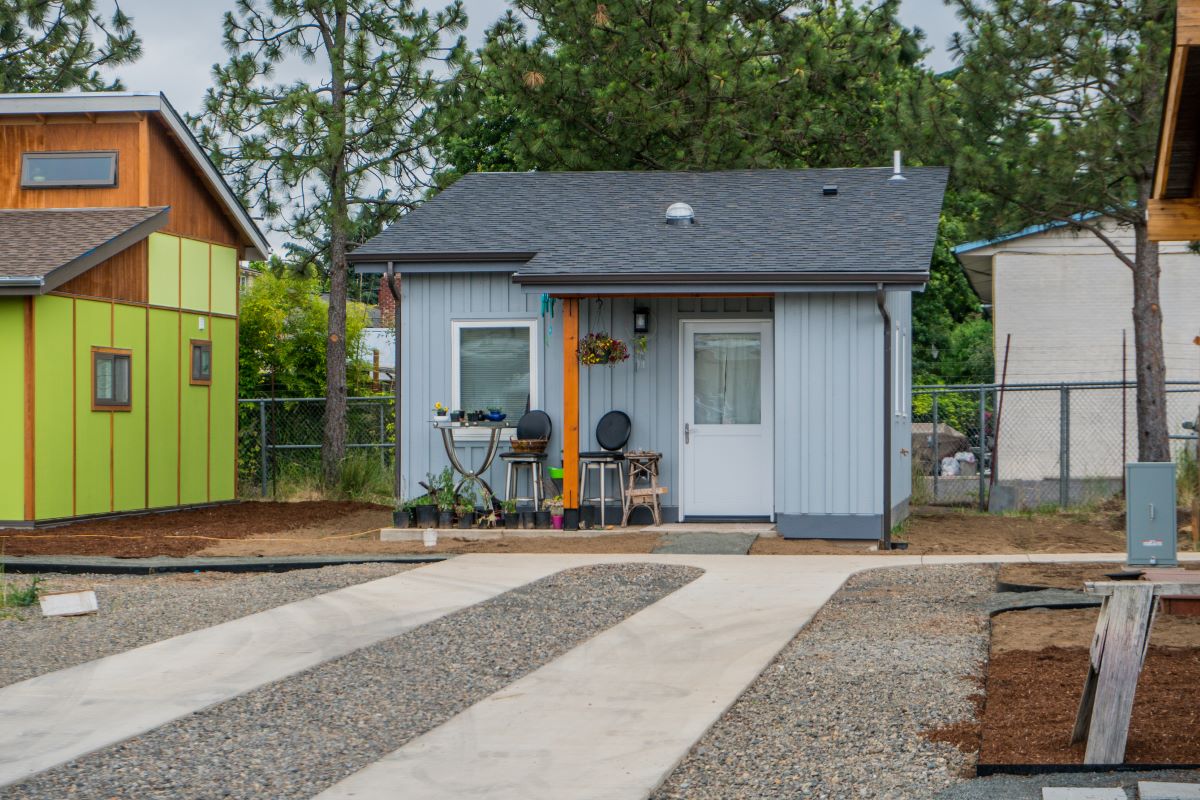As rates of unsheltered homelessness continue to rise, cities ranging from Greensboro, North Carolina, to Aurora, Colorado, have set up tiny home villages to help connect people experiencing homelessness with services and temporary housing.
But the tiny homes have received mixed reviews from people experiencing homelessness across the country. There have been a few fires at tiny home villages in Oakland and West Los Angeles. There are also concerns about whether the homes, also known as “pallet shelters,” can withstand extreme weather events given that they’re typically about 64 square feet and made out of recycled materials.
Advocates also say that the pallet shelters are often used to justify increasing encampment sweeps, where police forces and city contractors forcibly uproot homeless encampments.
The villages can sometimes come with arbitrary rules like curfews, limitations on visitors, and prohibitions against pets. The units also do not have kitchens or bathrooms, both of which can be provided at a separate fee.
One of the culprits behind the rise of tiny home villages for people experiencing homelessness is a startup from Everett, Washington, called Pallet.
The company produces pre-made tiny homes that can sleep two people and cost around $7,500 per unit, depending on what amenities are included. More than 80% of the company’s workforce have experienced housing instability or been through the justice system, and the company has helped open more than 100 villages in the US.
“People say, ‘Oh, homelessness will never end in our lifetime.’ I think that’s garbage,” Amy King, Pallet’s CEO, said. “I think we can. We should. We have the resources to. We just need to put the right people, decision-makers, at the center and push forward with intentionality to get it done, and we can.”
Birmingham, Alabama, is one of Pallet’s most recent customers.
In early January, Mayor Randall Woodfin announced the city would purchase 100 tiny homes for people experiencing homelessness. The city council agreed to spend $1 million of federal funds to purchase the units, which cost about $12,000 each. The units will have lockable doors, a desk, and heating and cooling systems.
“Our residents who are experiencing homelessness deserve to safely sleep in peace and with dignity,” Woodfin said.
In other states like California, the increased use of tiny homes has correlated with an increased prevalence of homeless sweeps.
For example, officials in Los Angeles opened the Eagle Rock Tiny Home Village—the city’s 10th village for homeless people—just two days before 400 police officers swept the Echo Park Lake encampment.
Avery Rhodes, the executive director of Community on the Rise, a nonprofit in Birmingham that works with the unhoused, told Vice News that she hadn’t heard any rumbling of any new camping bans being enacted.
“I hope that won’t be the case,” she said, noting that the issue would create a “point of contention” between the government and nonprofit service providers.
The efforts to move people experiencing homelessness into tiny homes come as federal data shows that more than 207,000 people sleep outside on a given night in the US. That total represents a 3.4% increase from 2020, the last year of available data.
In Birmingham, 342 out of the 943 total people counted in the last one-night count are unsheltered, according to data from One Roof, the local Continuum of Care. The number of unsheltered people has increased by 6.7% year-over-year, while the total population has increased by almost 8% over the same time.
Rhodes said the tiny homes in Birmingham are “definitely not a home” in the traditional sense for residents, but she is still hopeful that they will have a positive impact. A nearby shelter has been operating at capacity since July 2022 and has hosted upwards of 120 people on some nights despite only having enough room for about 90 people.
“This is a starter path for people to have somewhere safe to be, somewhere safe to keep their personal items,” Rhodes told Vice News.
How You Can Help
Temporary housing options for people experiencing homelessness in the United States are few and far between. We need to provide more affordable and accessible housing options if we are ever going to end homelessness.
That’s why we need you to contact your officials and representatives. Tell them you support building or preserving quality homes for homeless people. Tiny homes are a temporary solution and cannot be considered a long-term strategy for ending homelessness.











